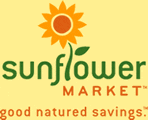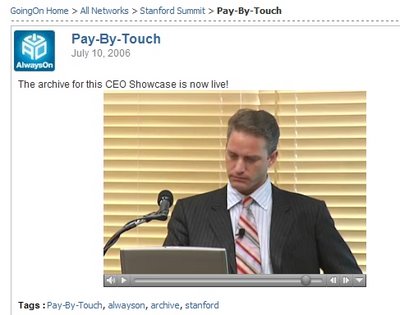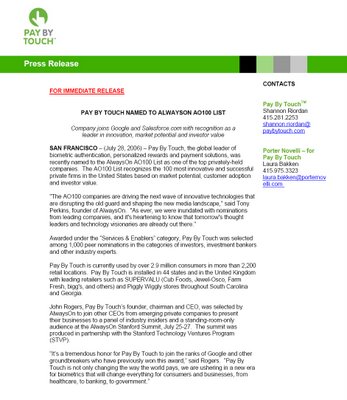
Supervalu To Use Pay By Touch in New Sunflower Market's
New Value-Priced Sunflower Market(TM) Makes its Chicago Debut in Lincoln Park
What: A Preview Party at Sunflower Market, a new organic and natural food market designed to meet the increasing customer demand for natural and organic foods at value prices
When: Tuesday, August 29, 2006 from 5 pm-8 pm
Where: Lincoln Park 1910 North Clybourn Chicago, IL 60614
Why: To provide the media a "sneak peek" at this exciting new concept in organic and natural foods.
How is it different? Sunflower Market is able to offer high quality organic and
natural foods for less because its operations are built around an efficient and smart store:
It's smart use of technology eliminates unnecessary costs:
-- It's the first natural and organic foods store to offer self checkout
-- It's also the first grocery store of any kind in the nationwhose products are 100 percent scan-able. An automated scalesystem allows customers to self-label all products sold by the pound resulting in a far speedier check-out process
 It uses Pay-By-Touch(TM) technology. The first natural and organic foods store to do so, its biometric system links checking/debit account information to a digital fingerprint to simplify the check-out process
It uses Pay-By-Touch(TM) technology. The first natural and organic foods store to do so, its biometric system links checking/debit account information to a digital fingerprint to simplify the check-out process
Supervalu appears to be going the way of Trader Joe's, Whole Foods, Wild Oats and others with a new organic and natural foods store concept under the Sunflower Market banner. The first unit is scheduled to open in January in Indianapolis.
In a released statement, Jeff Noddle, chairman and CEO of Supervalu, said, "Across the nation, we are seeing a growing demand for affordable organic foods with exceptional taste and nutritional quality. Sunflower Market draws on our expertise in small-box formats, and leverages our supply chain expertise, which enables us to deliver outstanding natural and organic products at a price point consistent with consumer expectations."
Supervalu's president for corporate retail, John Hooley, added in the same release, "At Sunflower Market, we will offer customers the convenience of a full shopping experience, with access to natural and organic products in all categories. We've developed a unique merchandising approach that will highlight our perishables, which include an extensive produce offering, natural, case-ready meats and fresh bakery and deli items. Simply put, our goal is to provide customers with great tasting, wholesome foods at affordable prices."
The typical Sunflower Market is expected to run 12,000 to 15,000 square-feet and stock between 8,000 and 12,000 skus.
The stores will have a heavy emphasis on private label with the Supervalu's specialty produce company, W. Newell & Co., providing most of the banner's fruit and vegetable needs. Sunflower Market will also carry over 100 items under Supervalu's new "Nature's Best" brand.
Supervalu will operate all Sunflower Markets as corporate stores and will provide the banner with information technology, merchandising and operations support.
New Value-Priced Sunflower Market(TM) Makes its Chicago Debut in Lincoln Park
What: A Preview Party at Sunflower Market, a new organic and natural food market designed to meet the increasing customer demand for natural and organic foods at value prices
When: Tuesday, August 29, 2006 from 5 pm-8 pm
Where: Lincoln Park 1910 North Clybourn Chicago, IL 60614
Why: To provide the media a "sneak peek" at this exciting new concept in organic and natural foods.
How is it different? Sunflower Market is able to offer high quality organic and
natural foods for less because its operations are built around an efficient and smart store:
It's smart use of technology eliminates unnecessary costs:
-- It's the first natural and organic foods store to offer self checkout
-- It's also the first grocery store of any kind in the nationwhose products are 100 percent scan-able. An automated scalesystem allows customers to self-label all products sold by the pound resulting in a far speedier check-out process
 It uses Pay-By-Touch(TM) technology. The first natural and organic foods store to do so, its biometric system links checking/debit account information to a digital fingerprint to simplify the check-out process
It uses Pay-By-Touch(TM) technology. The first natural and organic foods store to do so, its biometric system links checking/debit account information to a digital fingerprint to simplify the check-out processSupervalu appears to be going the way of Trader Joe's, Whole Foods, Wild Oats and others with a new organic and natural foods store concept under the Sunflower Market banner. The first unit is scheduled to open in January in Indianapolis.
In a released statement, Jeff Noddle, chairman and CEO of Supervalu, said, "Across the nation, we are seeing a growing demand for affordable organic foods with exceptional taste and nutritional quality. Sunflower Market draws on our expertise in small-box formats, and leverages our supply chain expertise, which enables us to deliver outstanding natural and organic products at a price point consistent with consumer expectations."
Supervalu's president for corporate retail, John Hooley, added in the same release, "At Sunflower Market, we will offer customers the convenience of a full shopping experience, with access to natural and organic products in all categories. We've developed a unique merchandising approach that will highlight our perishables, which include an extensive produce offering, natural, case-ready meats and fresh bakery and deli items. Simply put, our goal is to provide customers with great tasting, wholesome foods at affordable prices."
The typical Sunflower Market is expected to run 12,000 to 15,000 square-feet and stock between 8,000 and 12,000 skus.
The stores will have a heavy emphasis on private label with the Supervalu's specialty produce company, W. Newell & Co., providing most of the banner's fruit and vegetable needs. Sunflower Market will also carry over 100 items under Supervalu's new "Nature's Best" brand.
Supervalu will operate all Sunflower Markets as corporate stores and will provide the banner with information technology, merchandising and operations support.
.jpg)











